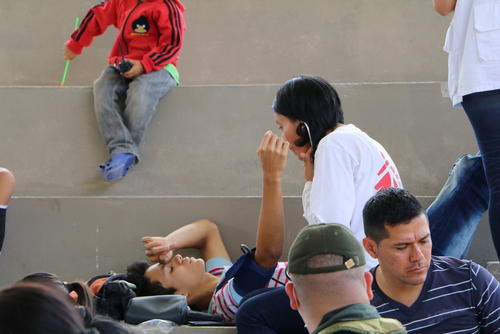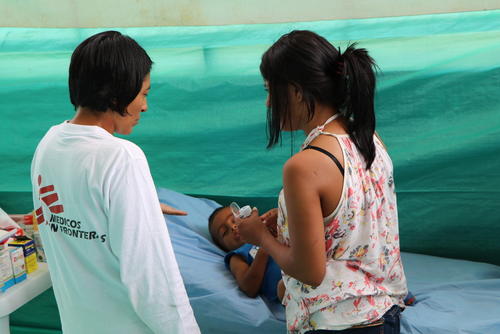Sulaith Auzaque is the coordinator of the Médecins Sans Frontières (MSF) emergency team in Colombia.
It’s a small, extremely mobile team that can move around the country following urgent alerts. Most of these relate to population displacements caused by outbreaks of violence; some are in response to natural disasters or epidemics.
In this interview, Sulaith talks about the interventions her team carried out in 2017 and gives her analysis of the situation in Colombia for 2018.

MSF: Which intervention in 2017 impacted you the most?
Sulaith: The intervention that made the biggest impact on me was responding to the landslide in Mocoa, the capital of Putumayo. The landslide in April was caused by three rivers bursting their banks. It caused more than 300 deaths and hundreds of people went missing, according to official figures. Because it was such a big incident, with so many dead and missing, a lot of help was organised. So the challenge was not a lack of people or means to help, but how to coordinate everyone to offer effective assistance.
What did MSF do?
The local hospital was not affected, although it came close. We made a large donation of medicines and emergency material, such as trauma kits. We also treated people directly in the shelters, as the hospital had to focus on the most serious cases.
Of course, there was a lot to do in terms of mental healthcare, due to the number of people who had lost family members and many more who didn’t know what had happened to their relatives. They didn’t know whether or not they were alive and what to do if they weren’t – what the process was, how to go to the morgue and look through the photos...
We provided help in terms of accompaniment and psychological assistance, trying to alleviate as much as possible a very distressing and complex process. A huge number of children disappeared, which deepened the sadness and despair.
How long were you there?
The intervention lasted a month. Given that there were other local aid organisations and that our presence may have been required elsewhere, we brought the intervention to a close as soon as we had trained the local organisations to continue with the work.

That was an unusual operation, what are your team’s operations usually like?
In recent years, the most typical interventions of the MSF emergency team in Colombia have focused on violence or the displacement or confinement generated by violence. There are three regular members, one in charge of coordination and medical assistance (me), a mental health specialist, and a logistics officer. That allows us to be very mobile. We keep our eyes open for alerts, we check the ones we receive, we move to verify the situation on the ground, and, if necessary, we act immediately. We also provide ongoing assistance over time if necessary.
One of the classic interventions that we carried out in March 2017 was in Chocó, where some 600 people were displaced. In that case, it was clear that the process of implementing the peace agreement signed between the Revolutionary Armed Forces of Colombia (FARC) and the government wouldn’t immediately mean an end to the violence.
Chocó is a very attractive area due to its proximity to Panama, its rivers and jungle – ideal for illicit activities, coca cultivation and cocaine paste production, making it the focus of territorial disputes between groups. The departure of FARC has created a vacuum that others have filled, and they have done so with violence, hence the displaced people. We followed them upstream to Pie de Pató and proceeded to offer medical and psychological attention. A lot of people stay with families from the city and live in crowded conditions. But a lot more settle in communal halls or wherever they can – usually places that are unsuitable for receiving so many people and have no shelters or tents, not enough latrines, etc.
Has there been a decrease in violence?
The violence has not diminished, but it has changed its name. The names of the armed groups have changed, and maybe their form of violence, that’s all. Those who renounced violence have been replaced. Civilians in places where they had become accustomed to the regime imposed by certain groups now have to adapt to the regimes of other groups, new groups that feel the need to “show their worth” through violence, using cruelty to ensure obedience.
In this regard, how do you see 2018 unfolding?
The upcoming elections this year could cause of greater violence, since different groups may back different candidates and this could lead to greater instability.
We must take into account the polarised views in society regarding whether or not to support the continuation of the peace process, which could have very serious consequences for certain communities.
In this scenario the state needs to strengthen the primary health and mental health response to emergency situations in remote areas that are difficult to access due to their geography or the presence of armed groups.
This year, MSF will strengthen the emergency team by taking on another member, a nurse, who will reinforce the medical side of things without hampering the team’s mobility. In some places we’ve been, people have had no medical attention for three years!
How does that happen?
It’s the result of a combination of factors: the medical missions have been attacked or stigmatised in certain areas, while other areas have been neglected by the authorities, who use the excuse of the violence.
Help doesn’t reach the places where it’s needed and we see an over-centralisation of medical services, whereby it’s always the patient who has to travel to be treated.
In addition to this, armed groups that take over new territory may restrict access, especially in areas where there is more coca farming, cocaine paste production and mining.
Our access is negotiated with the leaders of the communities, who are basically responsible for getting permission from the groups. Once that permission has been guaranteed and we have entered, we try to get in touch with the leaders of the groups in order to reinforce our presence, based on our principles of neutrality, independence and impartiality.
Our goal is to be there in the most acute phase and then be able to ensure assistance through other groups.
In 2017, MSF’s emergency team provided mental healthcare to 1,921 people and primary healthcare to 432, mainly in the departments of Chocó, Putumayo, Antioquia, Guaviare and Caquetá.


